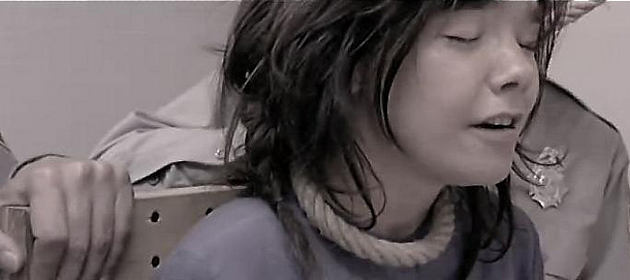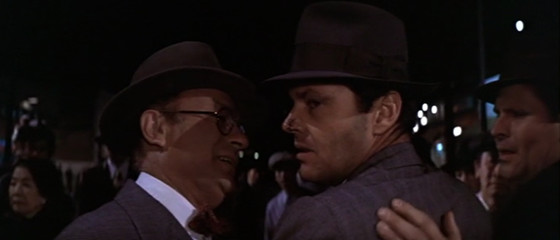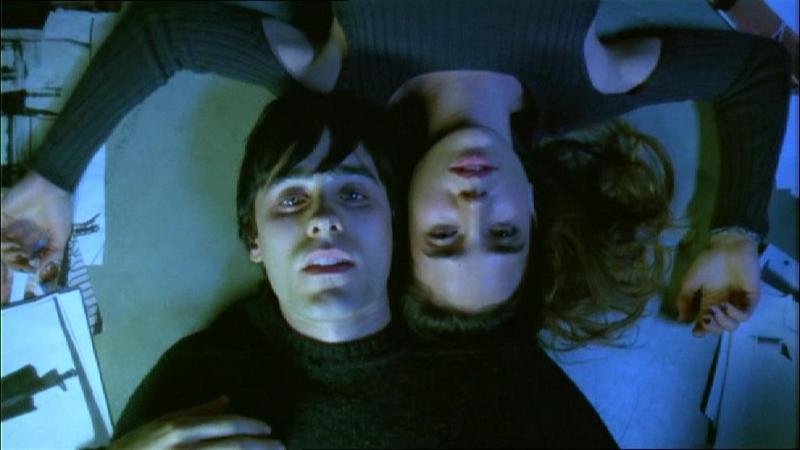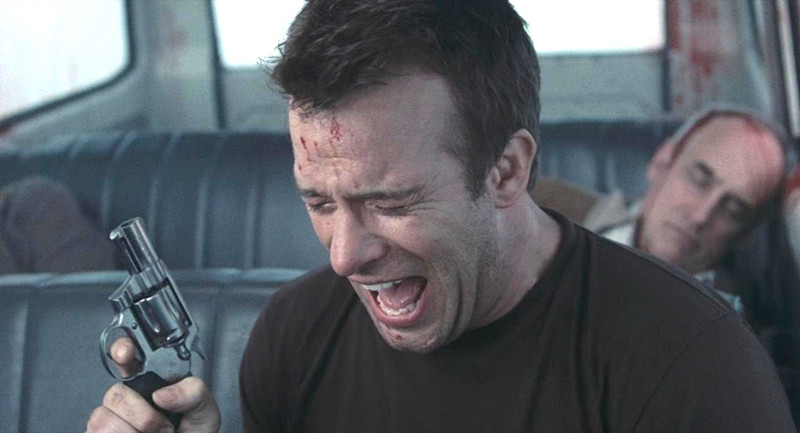5. Dancer in the Dark (2000)

What’s it About? Björk plays an immigrant factory worker in United States in 1964, in the state of Washington. She has a degenerative eye condition that’s slowly making her blind, and to make matters worse, her son has the same condition. She spends her days daydreaming of musicals and singing while saving up for an operation to prevent her son from losing his vision.
How Does it End? As Selma’s vision worsens, leaving her practically blind, she loses her job and her bastard of a landlord steals the money she was saving up for her son’s operation. After a violent confrontation, Selma is arrested and unfairly dubbed a liar, a murder and a communist and sentenced to death.
As she’s about to be hanged, she goes into hysterics. When she’s told that her son’s operation was successful, she gracefully accepts her fate and sings one last song as she’s hanged to death.
Why Is the Ending Depressing? Many of Lars von Trier’s films could easily slip into this list. Nothing ever ends happily in the bleak and nihilistic Danish director’s work. “Dancer in the Dark,” more so than any of his other films, mainly because of the protagonist played beautifully by Icelandic singer Bjork.
Out of all the characters in von Trier’s filmography and his “Golden Heart” Trilogy, Selma is perhaps the most touching, pure and soulful. While she’s naive to a fault and at certain times her choices can be frustrating, it’s the evil of the world and the hand it deals her that makes her plight and ending sympathetic.
4. Chinatown (1974)

What’s it About? Roman Polanski’s classic neo-noir mystery follows Jack Nicholson as J.J. “Jake” Gittes, a private investigator who uncovers an intricate web of deceit over California’s water supply. What starts out as another infidelity case soon morphs into something more sinister, as secrets that were probably better left alone are exposed.
How Does it End? After finding out that the supposed mistress is actually Evelyn’s sister/daughter, Jake arranges for them to flee to safety away from her slimy father Noah, who Jake plans to confront and expose. But Noah forces Jake to take him to Chinatown, where he intercepts Evelyn before she can take their daughter away.
The cops refuse to listen to Jake’s pleas, and Evelyn takes matters into her own hands and shoots Noah, which fails to do damage. The cops shoot Evelyn as she tries to drive away, and Noah takes his screaming daughter/granddaughter away to do to her what he did to Evelyn.
Why is the Ending Depressing? Early on in the film when Jake meets Noah for this first time, he warns him, “You may think you know what you’re dealing with, but trust me, you don’t.” Which sums up every film with a private investigator, if you think about it.
Aside from his best efforts to do the right thing in the end, Jake realizes the severity of that warning when it’s much too late. He would’ve been better off if he let things be, which is why he mutters to himself “as little as possible.” He and the viewer can only watch in complete shock and helplessness as evil prevails, which ends on the iconic line “Forget about it Jake. It’s Chinatown.”
3. Seven (1995)

What’s it About? Brad Pitt and Morgan Freeman team up as police detectives Mills and Somerset, who are investigating a mysterious serial killer known as “John Doe,” who themes his murders on the seven deadly sins.
How Does it End? In an unpredictable turn and with two murders left to complete his work, John Doe turns himself into police custody. He confesses to the murders and offers to take the two detectives to the location of his final two victims. After they arrive at a remote desert location, a delivery van shows up and a box is delivered. Doe tells Mills that he killed his wife who was pregnant (unknown to Mills) because he was envious of him, which represents the sin of envy.
The answer to the famous “what’s in the box?” line causes Mills to kill Doe, which signifies the sin of wrath, which completes Doe’s work. The police take a broken and devastated Mills away.
Why is the Ending Depressing? David Fincher’s signature film is one of the greatest examples of a plot twist done right. The many twists and turns seek only to enhance the story and its themes. What’s even scarier is that John Doe is in control of the whole story, and in some ways, the characters lives from the very beginning of the film.
The idealistic and arrogant Mills sees the world in black and white and thinks police work is as clean cut as good guys vs. bad guys. But nothing prepares him for the likes of John Doe. Even his soon-to-be-retired partner who has seen it all and is weary of the sick world they’re living doesn’t see it coming.
In the space of a moment, Mills loses it all and we’re left with a bleak look at the world. It’s an ending that’s as unpredictable as it is shocking. Some villains can’t be reasoned, with and sometimes the bad guys win, and not in the comic book way, either.
2. Requiem for a Dream (2000)

What’s it About? A dark yet brutally honest look at the different forms of drug addiction and how it can cause self-destruction, desperation, and disillusionment. It’s one of the most disturbing and gut-wrenching films ever made that offers no easy solutions or answers.
How Does it End? All of the main characters fall into the depths of their addictions and hit rock bottom. Sara ends up as a vegetable after electroconvulsive therapy, and has delusions that she finally makes it on the television show with her son.
Harry’s arm gets amputated, and he realizes that his girlfriend Marion won’t be visiting him and that he may never see her again. Tyrone remembers his mother as he suffers from withdrawals while in prison. And Marion gets all the heroin she wants after having degrading sex at a sleazy private show.
Why is the Ending Depressing? As graphic as it is, “Requiem for a Dream” is the type of film they need to show kids in school to show them the dangers of drug use and how addiction comes in many forms. It just gets bleaker and bleaker as we watch our characters spiral out of control and make one bad choice after another.
Aside from the relationships that tie them together, they are also connected by inherent loneliness and personal issues that lead them to self-destruct. And most depressing of all is that they end up truly alone with nothing but their delusions and the consequences of their actions for company.
1. The Mist (2007)

What’s it About? Frank Darabont’s third adaptation of a Stephen King novel follows the residents of a town who, after a thunderstorm causes a power outage, meet in a supermarket to get supplies. An unnatural mist soon covers the town bringing with it concealed monsters from a portal that are on the attack, which raises tensions among survivors bringing out the worst in man.
How Does it End? Seeing no hope for their dire situation after they run out of gas and are surrounded by the mist, a group of survivors decides to end things on their own terms rather than become tentacle food.
The group’s default leader David shoots them all with their consent, but runs out of bullets to use on himself. He steps out of the car and screams for the tentacle beasts to take him, but the U.S. Army shows up instead. They’ve sealed off the portal, restored order, and have rescued people. David falls to his knees, realizing that if they only they waited a little longer they would’ve all been saved.
Why is the Ending Depressing? Poor David, one can’t imagine how he felt, especially because he also gave his son a mercy kill and now he has to live with his actions. Changing the novels more ambiguous yet optimistic ending for a tragic and definite ending, Darabont crafted an unforgettable and gut-wrenching finale.
While the groups and David’s decision to end it all was understandable and seemed reasonable at the time, it all turns out to be premature. It’s a hard lesson on humanity’s actions in desperate and dark times, and how quick we are to rip each other apart and lose hope.